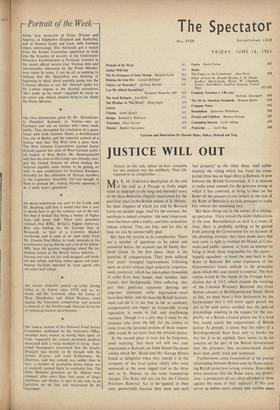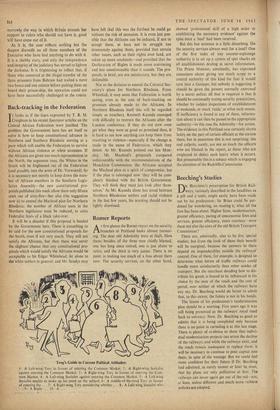JUSTICE WILL OUT
Victory on this side, defeat on that—complete for 'one moment was the antithesis. Then life returned to its complexities . . •
MR. E. M. FoasTER's description of the end of the trial in A Passage to India might stand as epigraph to the long and shameful story of the three Bahrainis illegally imprisoned for the past four years in the British colony of St. Helena, the final chapters of which are told by Bernard Levin on another page. And for the moment, the antithesis is indeed complete: the men's imprison- ment has been ruled a nullity, and their immediate release ordered. They are free; and for that at least we can be unreservedly glad.
But then life returns to its, complexities. There are a number of questions to be asked and answered before the account can be finally dec- lared closed. In the first place, there is the question of compensation. They have suffered four years' wrongful imprisonment, following upon an arrest without legal authority; imprison- ment, moreover, which has taken place thousands of miles from their homes, their families, their friends, their backgrounds. Their suffering—des- pite their generous statement denying any improper treatment while imprisoned—must have been bitter, and the least the British Govern- ment can do is to sec that as far as monetary compensation can repair an irreparable wrong reparation is made in full and overflowing measure. Though it is a pity that it must be the taxpayer who foots the bill; for the money to come from the personal pockets of those respon- sible would be no more than the strictest justice.
In the second place it must not be forgotten, amid rejoicing, that there are still two men imprisoned in Bahrain, on Jidda Island (the penal colony which Mr. Heath and Mr. George Brown found so delightful when they toured it in the company of the local police chief), who were sentenced at the same rigged trial as the three sent to St. Helena, on the same trumped-up charges. The Ruler did not ask for the Colonial Prisoners Removal Act to be' applied in their case, presumably because they were not such 'hot property' as the other three. And unfor- tunately the ruling which has freed the trans- ported three has no legal effect in Bahrain. It now behoves the British Government, if it is anxious to make some amends for the grievous wrong at which it has connived, to bring to bear on the Ruler all the pressure it can (which in the case of the Ruler of Bahrain is no little pressure) to make him release the remaining two.
But these things are in the nature of a tidying- up operation. Theie remain the wider implications of the case. Recrimination as such is a waste of time; there is probably nothing to be gained from pressing the Government for an account of the shocking attempts they have made since this case came to light to mislead the House of Com- mons and public opinion, or from an attempt to bring to book those responsible for the move— happily squashed—to hand the men back to the Ruler of Bahrain. But some expression of the Government's future attitude to the principles upon which this case turned is essential. The best course would be the repeal of the Foreign Juris- diction Act of 1913, which extends the working of the Colonial Prisoners Removal Act from British colonies to British-protected States. Short of this, we must have a firm declaration by the Government that it will never again permit the Act to be used unless satisfied that the judicial, proceedings resulting in the request for the hos- pitality of a British colonial prison are of a kind
that would satisfy the requirements of British justice. At present, it seems that the rulers of a British-protected State have only to invoke the Act for it to be applied; there seems to be no concern on the part of the British Government that the prisoners thus accommodated should have been justly tried and sentenced.
Furthermore, some examination of the precise relationship between Britain and the States enjoy- ing British protection is long overdue. How many more autocrats like the Ruler enjoy our protec- tion—a protection all too often afforded to them
against the mass of their subjects? If this case serves to define more closely and confine more narrowly the way in which Britain extends her support to rulers who should not have it, good will have come out of it.
As it is, the case reflects nothing but the deepest discredit on all those members of the Executive who have had anything to do with it. It is a shabby story, and only the independence and integrity of the judiciary has served to lighten the darkness. It is frightening to reflect that, if those who connived at the illegal transfer of the three prisoners from Bahrain had waited a mere two hours and one minute before putting them on board their prison-ship, the operation could not have been successfully challenged in the courts.











































 Previous page
Previous page